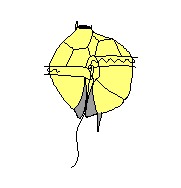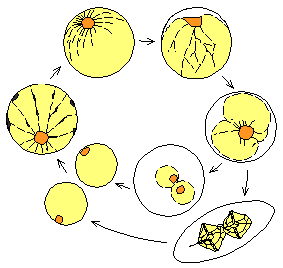Suborder Goniodomineae
From dinoflaj3
Revision as of 15:12, 6 December 2016 by Maintenance script (Talk | contribs)
| Gonyaulacaleans with a tabulation which accords with, or derives from, a pattern in which there are two or three fundital plates - always the posterior intercalary homologue (*1p) and the first antapical homologue (*1\'\'\'\'), and sometimes also the posterior sulcal homologue (*ps). The first antapical homologue (*1\'\'\'\') is the dorsalmost of the fundital plates, is five-sided ( quinqueform) and does not contact the distalmost postcingular plate(s) - i.e. the sixth postcingular homologue (*6\'\'\') - and, when it is outside the sulcus, the right sulcal homologue (*rs). There are typically five or fewer climactal plates. Secondary plate overgrowth occurs only at overlapping plate margins. | ||
 | ||
| Motile stage dominant in life-cycle. | Vegetative cyst dominant in life-cycle. | |
| GONIODOMACEAE | PYROCYSTACEAE | |
 |  | |
Parent: Order Gonyaulacales part 1